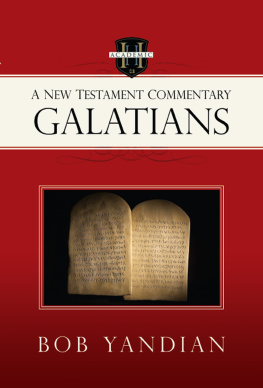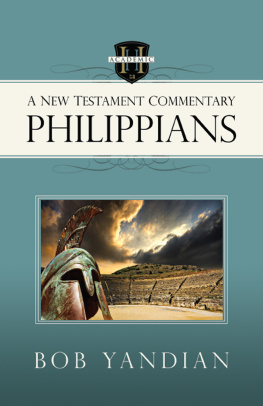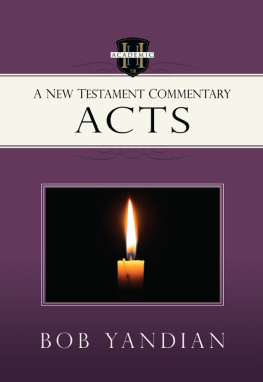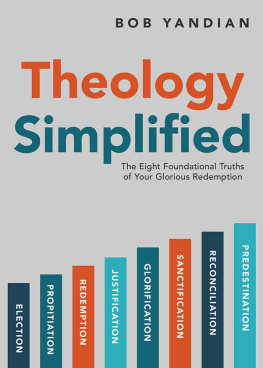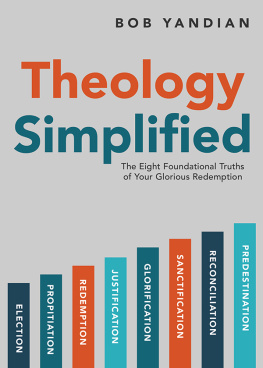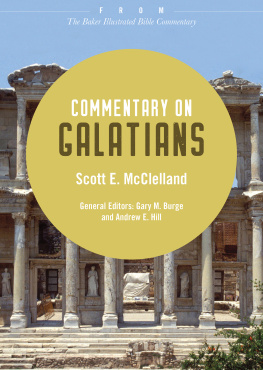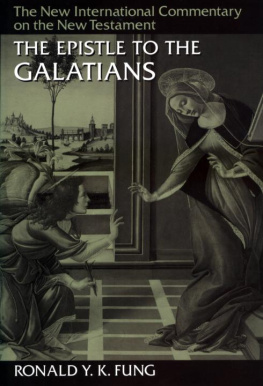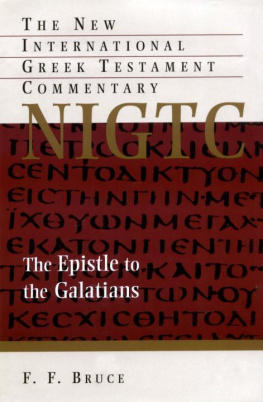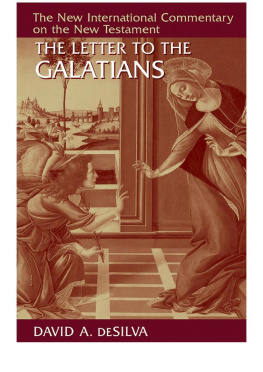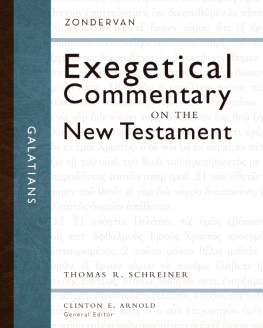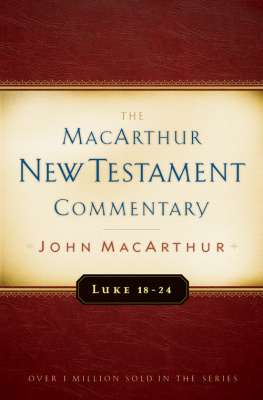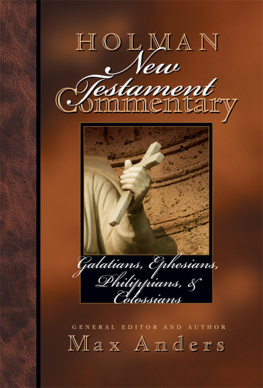Bob Yandian - Galatians: A New Testament Commentary
Here you can read online Bob Yandian - Galatians: A New Testament Commentary full text of the book (entire story) in english for free. Download pdf and epub, get meaning, cover and reviews about this ebook. genre: Religion. Description of the work, (preface) as well as reviews are available. Best literature library LitArk.com created for fans of good reading and offers a wide selection of genres:
Romance novel
Science fiction
Adventure
Detective
Science
History
Home and family
Prose
Art
Politics
Computer
Non-fiction
Religion
Business
Children
Humor
Choose a favorite category and find really read worthwhile books. Enjoy immersion in the world of imagination, feel the emotions of the characters or learn something new for yourself, make an fascinating discovery.
- Book:Galatians: A New Testament Commentary
- Author:
- Genre:
- Rating:4 / 5
- Favourites:Add to favourites
- Your mark:
- 80
- 1
- 2
- 3
- 4
- 5
Galatians: A New Testament Commentary: summary, description and annotation
We offer to read an annotation, description, summary or preface (depends on what the author of the book "Galatians: A New Testament Commentary" wrote himself). If you haven't found the necessary information about the book — write in the comments, we will try to find it.
Galatians: A New Testament Commentary — read online for free the complete book (whole text) full work
Below is the text of the book, divided by pages. System saving the place of the last page read, allows you to conveniently read the book "Galatians: A New Testament Commentary" online for free, without having to search again every time where you left off. Put a bookmark, and you can go to the page where you finished reading at any time.
Font size:
Interval:
Bookmark:

Convenient.

For the latest Harrison House product information and author news, look no further than your computer. All the details on our powerful, life-changing products are just a click away. New releases, email subscriptions, testimonies, monthly specials find them all in one place. Visit harrisonhouse.com today!
GALATIANS
A New Testament Commentary
Bob Yandian
All bolded and, unless otherwise indicated, block scripture quotations are from the New King James Version of the Bible. Copyright 1982 by Thomas Nelson. Used by permission. All rights reserved.
All other scripture quotations, unless otherwise noted, are from the King James Version of the Bible.
Scripture quotations from the following versions are used by permission:
New American Standard Bible , 1960, 1962, 1968, 1971, 1973, 1975, 1977 by The Lockman Foundation.
Holy Bible, New International Version , 1973, 1978, 1984 by the International Bible Society.
The Living Bible , 1971 by Tyndale House Publishers, Wheaton, Illinois.
Galatians: A New Testament Commentary
ISBN: 978-1-68031-186-0
2016 by Bob Yandian
Bob Yandian Ministries
PO Box 55236
Tulsa, OK 74155
www.bobyandian.com
Published by Harrison House Publishers
Tulsa, OK 74155
www.harrisonhouse.com
All rights reserved under International Copyright Law. Contents and/or cover may not be reproduced in whole or in part in any form without the express written consent of the publisher.
Printed in the United States of America.


My heart echoes a statement Peter made in his last epistle:
For this reason I will not be negligent to remind you always of these things, though you know and are established in the present truth.
2 Peter 1:12
The for this reason was to build on his previous statement Peters desire for all believers not just to get to heaven, but to have an abundant entrance into heaven. A working knowledge and practice of the Word of God is necessary for an abundant entrance, which is marked by rewards and rulership.
In order to establish that abundant entrance, Peter taught believers what they should know again and again, though you know them. What was taught them was the present truth. The present truth is what was being written in the day of the apostles Peter, Paul, John, and James.
This present truth is what believers still need to be gloriously saved. The Old Testament is to be studied in the light of the New Testament epistles. The four gospels are to be studied in the light of the New Testament epistles. Not only should every Christian know the epistles, they should be established in them.
This is why I have written this series of books, verse-by-verse teachings on the epistles of Paul, Peter, John, and James. This is truly meat for our time period, our dispensation: the church age.
Bob Yandian
Author
Galatians is an exciting book. In it, the apostle Paul laid down a foundation of what every Christian needs to guard against. Its the most subtle trap believers can fall into: the trap of legalism.
Now when legalism is mentioned, most Christians automatically think of the Ten Commandments or the Mosaic law. But legalism involves much more than these two obvious examples. It is much more subtle than that, much less evident and therefore much more dangerous.
To the Jews of Pauls day, legalism was primarily an overemphasis on the observance of Jewish law which blinded them to the gospel of salvation by grace. To the modern-day Christian, legalism is more an attitude than an act, which makes it all the more difficult to detect and avoid. We may not even be aware that we are guilty of it. Because it is so insidious, we have unsuspectingly allowed this attitude to creep into virtually every facet of our daily Christian lives. In this study we will be defining legalism and examining its effect upon us as Christians. We will see how it has come to exert an influence upon everything in our church life from water baptism to personal witnessing. We will also consider the dangers of legalism and discuss ways to overcome this most subtle of Satans attack upon the church of Jesus Christ.
In essence, the book of Galatians is a declaration of faith and faith alone. Faith for salvation and faith for spirituality. This faith is not based on any effort or action or observance on our part, but is founded solely and entirely upon the grace of God. In fact, Galatians could be called a manifesto of grace.
Before we actually begin our study of this powerful book, lets review a moment. Exactly who were the Galatians to whom Paul addressed this letter? If you are familiar with New Testament history, you will remember that Galatia was an area northwest of Israel that had been settled by the Gauls in the third century. It became a Roman province in 25 B.C., some years before Paul began his missionary journeys to the region. The Galatians were descendants of barbaric tribes that had infiltrated the Roman Empire. These tribes were all branches of the Celts who later settled Ireland, Scotland, and Wales. The Galatians are distant cousins of the modern-day Irish.
In his opening salutation, Paul directed his remarks to the churches of Galatia. Notice, churches is plural. Galatians is the only one of Pauls epistles directed to more than one church. Ephesians was written to the church in Ephesus; Philippians addressed the church in Philippi. However, Galatians was sent to the churches of Galatia, because Galatia is not a city but a province.
There were four major cities in the province of Galatia: Antioch, lconium, Derbe, and Lystra. The city of Lystra should be familiar to us because thats where, on his first missionary journey, Paul was nearly stoned to death. But God restored him, and he was able to go back into the city to preach to the people. (You can read about this event in Acts 14.)
In the book of Galatians, we will be considering several basic themes: the Abrahamic covenant, the blessing of Abraham, redemption from the curse of the law, the fruit of the Spirit versus works of the flesh, and several others. As we study, we will be referring back to the Old Testament where we will learn about Abraham, Sarah, Hagar, Isaac, and Ishmael. From there we will go to the New Testament to follow Pauls missionary journey to Galatia. We will talk about Pauls thorn in the flesh and consider what it might have been. We will see how his message was always the same: faith for salvation and faith for spirituality. We will see how, because of his message, Paul was hounded and harassed everywhere he went by legalistic Judaizers with their insistence that organized religion was the only means to salvation. Through all this, our attention will be fixed upon one central truth: the grace of God poured out at Calvary, freeing us from all self-striving so we may live truly Spirit-filled, fruitful lives of freedom and joy.
In chapter 1 of Galatians, we will read Pauls testimony of his call to the ministry. We will see how he stressed that it was the Lord Himself who called, commissioned, and ordained him to carry the good news of salvation by grace to the Gentiles. We will see that Pauls knowledge of this truth came not from man or from men, but directly from God through personal revelation.
Font size:
Interval:
Bookmark:
Similar books «Galatians: A New Testament Commentary»
Look at similar books to Galatians: A New Testament Commentary. We have selected literature similar in name and meaning in the hope of providing readers with more options to find new, interesting, not yet read works.
Discussion, reviews of the book Galatians: A New Testament Commentary and just readers' own opinions. Leave your comments, write what you think about the work, its meaning or the main characters. Specify what exactly you liked and what you didn't like, and why you think so.

